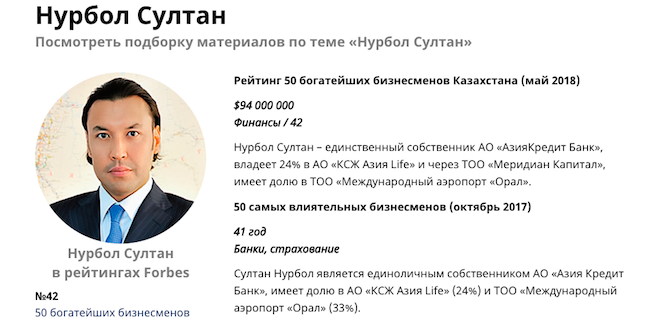It looks like yet another Kazakhstan’s bank has found itself on the brink of collapse. S& P Global Ratings has downgraded AsiaCredit Bank’s long- and short-term rating to ‘CCC+/C’ from ‘B’/B’ and lowered its national scale rating to ‘kzB’ from ‘kzBB-‘; outlook ‘Negative’.
In the meantime, only a year ago, the state of affairs at AsiaCredit Bank, albeit not ideal, was believed to be sustainable. To confirm this, we will cite the article published by the Association of Financers of Kazakhstan on November 10, 2017 and titled «AsiaCredit Bank Recognizing Problem Loans and Optimizing Expenditures».
It looks like AsiaCredit Bank’s management and its majority shareholder Sultan Nurbol Sarybayuly who owns 99,9% of the bank were unable to overcome the problems. Here is how S&P Global Ratings assesses their efforts in the rating action of October 10, 2018 (text in bold by kz.expert).
«The downgrade reflects our view that AsiaCredit Bank’s funding profile has continued to worsen this year, following deterioration in clients' confidence in small and midsized banks. We believe that AsiaCredit Bank’s ability to attract new customers, as well as retain its current clientele, has substantially weakened. Over the first nine months of 2018, the bank’s deposits decreased by 17%, having already decreased by 29% in 2017, and continue to remain under pressure. We still consider the bank’s liquidity position as adequate, due to the bank’s compliance with all regulatory liquidity requirements and a structurally high proportion of liquid assets on the balance sheet. We note that the bank will have to replace Kazakhstani tenge 9 billion (or 8,5% of its total liabilities) in funding attracted from bonds in summer next year, which we believe will be challenging.
We also note that, after the audit of National Bank of Republic of Kazakhstan, AsiaCredit Bank is obliged to create significant loan loss provisions, exceeding our previous base-case expectations. We project the bank’s credit costs will increase to about 3,2% in 2018 and 2,4% in 2019. The bank’s nonperforming assets stood at about 8% as of June 30, 2018, but we believe that, given the amount of additional provisions the bank needs to create, the actual share of nonperforming loans could be higher in the future.
Should provisioning needs be higher, or lasting over a prolonged period, the bank will be likely be unable to sustain current capital levels, in our view. As of now, we still assess the bank’s capital position as moderate, and expect its risk-adjusted capital ratio will remain at 5,5%-6.5% over the next 12-18 months, given further moderate business downsizing.
We believe the bank relies on business, financial, and economic conditions to meet its financial commitments. That said, if the bank doesn’t resume its business dynamism and stabilize it depositor base, we think it’s highly likely that its current capital and/or liquidity buffers will erode in the next 12 months, increasing the risk that it will breach regulatory ratios».
Commenting on the above, we will point out that the main issue lies in the question whether the business, financial, and economic environment as well as the National Bank of the Republic of Kazakhstan will be benevolent to AsiaCredit Bank.
We believe it to be unlikely. And not only because the socio-economic situation in Kazakhstan is far from being trouble-free. The thing is that Kazakhstan has a-plenty of private banks and their profitability has plummeted while the fight for the qualitative borrowers has escalated off-scale. Another reason is that AsiaCredit Bank’s owner has no serious political protection in Akorda.
After the 2012 death of his father Sarybay Sultanuly Kalmyrzayev (Sarsybay Sultanovich Kalmyrzayev), one of the Nursultan Nazarbayev’s allies that used to be called Akorda’s «behind-the-scene’s manipulators», Sultan Nurbol Sarybayuly (even though he had managed to keep his fortune) had immediately lost his position as the CEO of KazTransGas NC.

In other words, along with his father, he had lost the political «shelter» as well as the possibility to support his private business via the means that are customary for Kazakhstan.
Apart from that, Sarybay Sultanuly Kalmyrzayev’s death speeded up and perhaps even predetermined the destruction of the so-called «Southern» clan that has not managed to recover ever since.
For these reasons, we believe its is highly unlikely that the Government and the NBK will support AsiaCredit Bank or that the Regulator will be willing to show mercy.
Therefore, everything will depend on whether Sultan Nurbol Sarybayuly will be able or willing to support the bank via his own money or whether he will choose to exit the banking business due to the latter’s riskiness, low-profitability, and problem-plagued nature.
The answer to this question will be known in a few months; in the meantime, the bank’s owner has taken a step that can be called no other than an attempt to run away from the problems — AsiaCredit Bank had asked S&P Global Ratings to withdraw the credit ratings and the agency granted this request on October 17.
Photo from www.kaztransoil.kz




